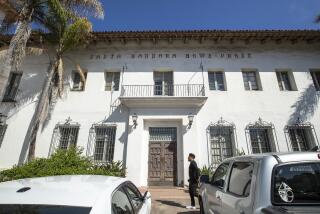Paper Folds After Seeking Public Bailout : St. Louis Globe-Democrat Had Asked for City, State Bond Issues
- Share via
The St. Louis Globe-Democrat, the 134-year-old morning daily twice near extinction in the last three years, ceased publication Wednesday after a public financing plan foundered in court.
“We’re closing down; the paper is out of business,” said Managing Editor William Feustel shortly after the court action.
Some of the paper’s 700 employees headed across the street to the Missouri Grill. “Right now, I’m going to get drunk,” said Jack Fahland, a Globe photographer for 21 years.
Court Won’t Hear Appeal
The paper closed moments after the Missouri Supreme Court in Jefferson City refused to hear an appeal that might have cleared the way for a financial bailout.
In what newspaper industry officials believe was the first case of an American newspaper’s appealing for public financial backing, the Globe-Democrat had asked the state of Missouri and the city of St. Louis to issue $15 million in public bonds, most of which the paper intended to use to build a printing plant.
The Missouri Industrial Development Board had agreed to the first $2.4 million and said it was likely to raise an additional $6.6 million. The city had indicated that it would raise $4 million through a tax-free bond issue and $2 million through a federal grant.
However, the plan failed Tuesday when the paper discovered that St. Louis attorney Norman Pressman intended to challenge the bailout as a violation of the state constitution.
‘It Is an Outrage’
“The Globe is an organization that endorses political candidates, speaks out on social policy, shapes public opinion. It is an outrage that the citizens should be asked to subsidize it” in any way, Pressman said in an interview Wednesday.
To head Pressman off, Globe executives sought to have the state Supreme Court resolve the issue of legality immediately, arguing that no investor would buy the bonds under threat of a legal challenge. But the justices ruled that the case must first be heard by a lower court, and Globe-Democrat officers pronounced the paper dead.
Even before the legal challenge, the proposed bailout had stirred ill will in St. Louis. For one thing, it pitted against each other two principles dear to American journalists--the survival544171552belief that newspapers must remain aloof from the government they cover.
The plan had also provoked charges of an old-fashioned back-room political deal, with critics pointing to connections between the paper’s owners and John Ashcroft, Missouri’s Republican governor, as well as to the bad blood between St. Louis Mayor Vincent C. Schoemehl Jr. and the Globe-Democrat’s rival, the St. Louis Post-Dispatch.
The Globe was St. Louis’ conservative Republican paper, while the Post-Dispatch is liberal and Democratic.
Globe owner William E. Franke is a Republican Party activist who ran for Congress in 1978. In 1984, together with Globe-Democrat Publisher John Prentis, he had contributed more than $27,000 to Ashcroft’s election campaign. The Industrial Development Board to which the Globe appealed for its bailout is appointed by the governor.
As for Schoemehl, critics had suggested that he was motivated to help finance the Globe in part because of differences with the Post-Dispatch. Earlier this year, he had likened the Post to “a Nazi propaganda machine” after it published stories about city contracts going to his campaign contributors.
The Globe’s problems go back to November, 1983, when its owners, the Newhouse family, concocted a plan with the Pulitzer family, owners of the Post-Dispatch, to close it down. The two papers were then publishing under a joint operating agreement, sharing presses, business operations and profits.
Mayor Filed Suit
Under the plan, the Newhouses would have shut the Globe and shared in the Post’s future profits. But, after Schoemehl filed a suit in federal court--later joined by the state--charging “collusion,” the Justice Department ordered the Globe to seek a buyer.
It found Jeffrey M. Gluck, a 30-year-old magazine publisher, who revived the suspended Globe in February, 1984. Within two years, Gluck filed for bankruptcy and the Globe again suspended publication.
Last January, with the help of a bankruptcy court and $500,000, Franke and Prentis purchased the Globe. Since then, they invested a reported $7.5 million to keep the Globe alive but failed in their efforts to attract bank loans or new partners to buy printing presses.
Staff writer Dick Wagner contributed to this story.
More to Read
Sign up for Essential California
The most important California stories and recommendations in your inbox every morning.
You may occasionally receive promotional content from the Los Angeles Times.













